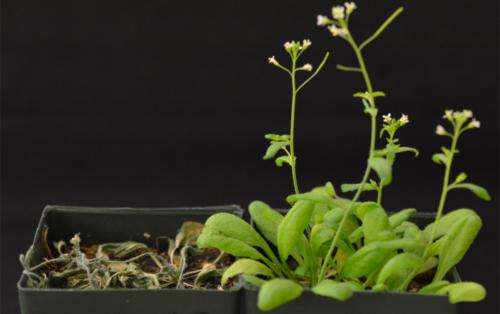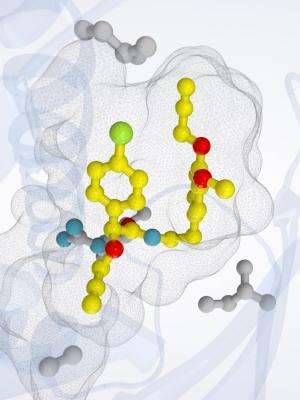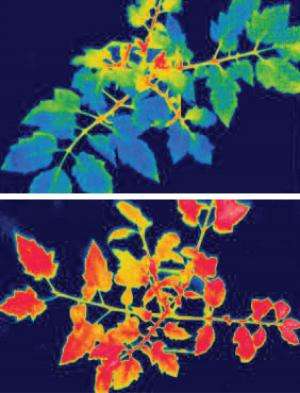Researchers reprogram plants for drought tolerance

Crops and other plants are constantly faced with adverse environmental conditions, such as rising temperatures (2014 was the warmest year on record) and lessening fresh water supplies, which lower yield and cost farmers billions of dollars annually.
Drought is a major environmental stress factor affecting plant growth and development. When plants encounter drought, they naturally produce abscisic acid (ABA), a stress hormone that inhibits plant growth and reduces water consumption. Specifically, the hormone turns on a receptor (special protein) in plants when it binds to the receptor like a hand fitting into a glove, resulting in beneficial changes—such as the closing of guard cells on leaves, called stomata, to reduce water loss—that help the plants survive.
While it is true that crops could be sprayed with ABA to assist their survival during drought, ABA is costly to make, rapidly inactivated inside plant cells and light-sensitive, and has therefore failed to find much direct use in agriculture. Several research groups are working to develop synthetic ABA mimics to modulate drought tolerance, but once discovered these mimics are expected to face lengthy and costly development processes.
The agrochemical mandipropamid, however, is already widely used in agricultural production to control late blight of fruit and vegetable crops. Could drought-threatened crops be engineered to respond to mandipropamid as if it were ABA, and thus enhance their survival during drought?
Yes, according to a team of scientists, led by Sean Cutler at the University of California, Riverside.

The researchers worked with Arabidopsis, a model plant used widely in plant biology labs, and the tomato plant. In the lab, they used synthetic biological methods to develop a new version of these plants' abscisic acid receptors, engineered to be activated by mandipropamid instead of ABA. The researchers showed that when the reprogrammed plants were sprayed with mandipropamid, the plants effectively survived drought conditions by turning on the abscisic acid pathway, which closed the stomata on their leaves to prevent water loss.
The finding illustrates the power of synthetic biological approaches for manipulating crops and opens new doors for crop improvement that could benefit a growing world population.
"We successfully repurposed an agrochemical for a new application by genetically engineering a plant receptor—something that has not been done before," said Cutler, an associate professor of botany and plant sciences. "We anticipate that this strategy of reprogramming plant responses using synthetic biology will allow other agrochemicals to control other useful traits—such as disease resistance or growth rates, for example."

Study results appear online Feb. 4 in Nature.
Cutler explained that discovering a new chemical and then having it evaluated and approved for use is an extremely involved and expensive process that can take years.
"We have, in effect, circumvented this hurdle using synthetic biology—in essence, we took something that already works in the real world and reprogrammed the plant so that the chemical could control water use," he said.
Protein engineering is a method that enables the systematic construction of many protein variants; it also tests them for new properties. Cutler and his co-workers used protein engineering to create modified plant receptors into which mandipropamid could fit and potently cause receptor activation. The engineered receptor was introduced into Arabidopsis and tomato plants, which then responded to mandipropamid as if they were being treated by ABA. In the absence of mandipropamid, these plants showed minimal difference from plants that did not possess the engineered protein.
More information: Nature, DOI: 10.1038/nature14123" target="_blank">nature.com/articles/DOI: 10.1038/nature14123
Journal information: Nature
Provided by University of California - Riverside



















